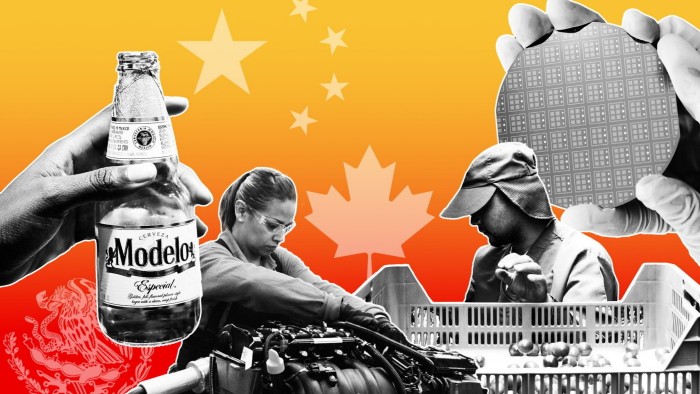Physical Address
304 North Cardinal St.
Dorchester Center, MA 02124
Physical Address
304 North Cardinal St.
Dorchester Center, MA 02124

Wall Street is bombing American companies with questions about how they deal with Donald Trump’s commercial wars, on an early mark on how the president’s policies have through American companies.
The word “tariff” appeared at least once in more than 200 profitable calls from analysts with analysts and investors, among the groups listed in the S&P 1500, the boat of American companies that reported this year, according to FactSet data. The rise in information about commercial fees repeat a similar leap during the first period of Trump in 2017-21.
Wall Street’s increasing interest in how to confront companies with commercial fees confirms how Trump’s commercial skirmishes affect groups through a wide range of industries.
The US President had planned to impose 25 percent of the fees this week on Canada and Mexico, claiming that they needed to exert more effort to treat immigration and fentian flows. Late Monday agreed to stop the tariff against Mexico and Canada for a month, while moving forward with a 10 percent new tariff over imports from China.
“We are dealing with China. We are dealing with Mexico. David Johnson, financial manager of the fishing, camping and diving company, said Johnson in the open air, in a call on Monday before Trump’s role.
“We are working on mitigation strategies now.”
Mexico is the largest source of American imports, followed by China and Canada. The manufacture of cars, devices and agriculture depends among the sectors that depend greatly on the North American trade across the border.
The CEO of Tyson Foods at Donnie King said that Meatpacker was running “emergency planning” of any retaliatory tariff for pork sold to Mexico. American pork producers shipped more than 1 million tons to Mexico last year, according to the US Meat Export Union.
“So, what we will do, whether it is pork or whether it will be the chicken, is that we will find other markets, we will benefit from our global knowledge and experiences to try to transfer these products if necessary,” King told analysts. Monday.
Alcoholic beverages are not simple to re -steer like a commodity like pork.
Johnny Walker Diaageo has already calculated that if the customs tariff for Mexico and Canada began in March, the operating profit of Spirits Giant will suffer from a $ 200 million strike in the fiscal year until June 2025.
The company said that it had planned all possibilities and could reduce 40 percent of the effect before resorting to high prices through stock management, such as charging the additional product to the United States before any new tariff.
“It is a very fluid situation,” said Debra CEO, Debra crew on Tuesday. “But we have a lot of cranes that we can withdraw, and we continue to deal with the American administration,” as well as the Canadian and Mexican authorities.
In another mark on the effects on the brands that focus on consumer, the Toymaker Mattel maker said on Tuesday that the new customs tariff may push it to raise US prices because it contains factories in countries including China and Mexico.

The effects can be wide in the industrial sector.
“Some auto parts can cross the border several times while producing cars,” said Bord Lock analyst Junk. Consumer costs.
Even after heavy local investment in the past few years, the American renewable energy industry depends on China. More than 70 percent of the world’s inputs of solar panels such as polysilicon, chips and alloys in China are produced, as well as more than 60 percent of battery components such as cathodes, involvement and electrolyte.
Clean energy executives have warned that the customs tariff will raise the costs of equipment and reduce the law to reduce inflation, which included $ 370 billion in federal incentives to transport energy. Trump opposes the legislation, which was signed by former President Joe Biden in 2022.
“We will not die because of this, but we prefer to spend on creating job opportunities,” said Martin Bozcharok, Chief Executive Officer of Hel -le, who runs a solar energy factory in Minnesota and import equipment from China.
As the customs tariff stopped on Mexico and Canada late on Monday, investors showed signs of relief. The shares jumped for the automated surgical equipment manufacturer, which last month warned of success of the customs tariff as “a large part of our tools are currently being manufactured in Mexico.”
In contrast, Napco Security Technologies, which is based in New York, described a collection base in the Dominican Republic.
CEO Richard Solwai told analysts this week that the competitors “made everything in China.” “Therefore, I expect that 10 percent (tariff) will make us more competitive in the market and help us win more on the market because we have superior products at high prices, traders are sensitive to prices.”
Participated in the reports of Gregory Mayer, Taylor Nicole Rogers, Amanda Chu and Oliver Barnes in New York, Claire Bushi in Chicago, Madeleine Speed and Suzana Savage in London